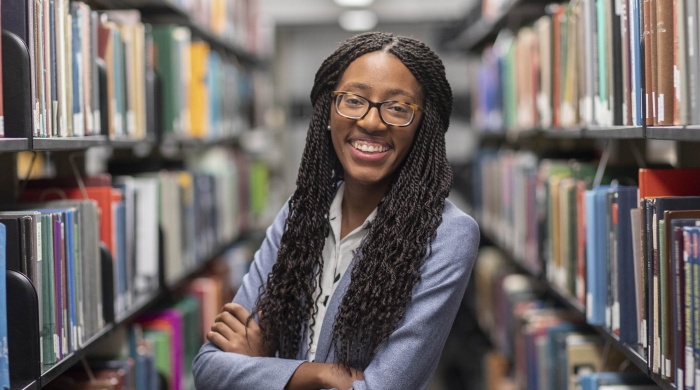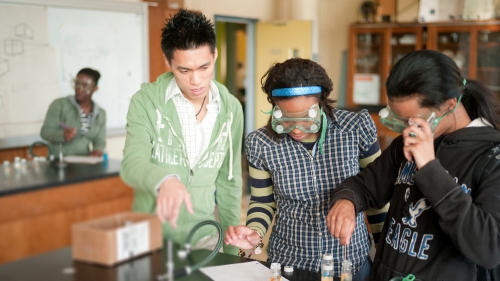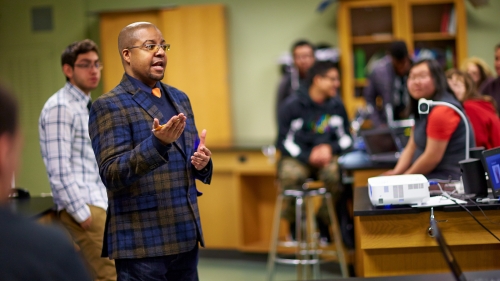Through interviews and focus groups, Black women reveal ways they combine traditional science curricula and standards with lessons about race, gender, and class inequities.
Whether teaching about the practices and systems that led to high rates of diabetes in Black communities or leading discussions about the Flint water crisis, Black female science teachers are finding ways to incorporate anti-racist teaching in their classrooms, according to a new study by science education researchers.
In a series of interviews and Sista Circles (group settings for Black women to develop and exchange ideas) in 2020, 18 Black women (teaching grades 5 through 12) shared their teaching practices and efforts to build critical consciousness among their students and colleagues and connect history and culture to science. The findings are published in the Journal of Research in Science Teaching.

Getty images/FatCamera.
“Science education has typically been approached in a neutral, apolitical way that has failed to acknowledge inequity,” says lead author Alexis Riley, assistant professor of science education at NYU Steinhardt. “This work considers what science content or exploration means for students and teachers who employ their racialized, gendered, and classed experiences. It asks, how or in what ways do Black women teachers talk about their implementation of anti-racist practices through their science teaching?”
The researchers uncovered four themes in their analysis:
Bringing something new to the community, while acknowledging students’ norms and culture
Teachers sought to provide new experiences to their students, including field trips or science fair participation, that was not mandated in the curriculum. “For example, Dr. Porter took students outside of their Brooklyn, New York, community so they could engage in natural phenomena outside of the classroom and the City,” the authors write.
Using established science curricula standards by encouraging scientific and sociological questions
Teachers made cultural and sociopolitical connections to science while using K-12 science content standards known as Next Generation Science Standards, specifically encouraging students to ask questions. According to the study, “[asking] questions in science can be tied to social justice because science is typically presented as facts and facts have historically hurt marginalized groups when not questioned. Consider the Tuskegee Syphilis experiment of 1932 to 1972 or the results shared from the Eugenics movement of the 20th century.”
Teaching at the intersection of history, culture, and science learning and teaching
Teachers provided historical, social, and cultural contexts to scientific discussions. For instance, the authors describe an educator who would incorporate history into her “science education courses. As a teacher educator and informal science educator, she revealed one of the main reasons African people were enslaved and dragged to America – for their agricultural skills….”
Building critical consciousness in the science classroom
Teachers empower students to think critically about ways that dynamics of privilege and oppression are present in real-world issues. “When teaching in Detroit, Ms. Perez taught about diabetes, a disease that heavily affected people in the Black community. She encouraged students to ask questions about the socio-political factors in the community that created these conditions, such as redlining and food deserts,” the authors write.
“Teacher education programs have the daunting task of preparing an 80 percent White teaching force to teach in communities of color where most teachers have little experience or knowledge. Teacher education programs also must address the differing needs of teachers of color based on their differing racialized, classed, and gendered experiences,” Riley says. “In order to connect science teacher education to the reality of today’s classrooms, we must radically change the teacher education model by interweaving race and cultural studies into all facets of our learning spaces and develop more urban science education programs.”
The study was co-authored by Felicia Moore Mensah, professor of science education and department chair of the Department of Mathematics, Science, and Technology at Columbia University.
Press Contact
(646) 469-8496
Related Articles
BlackCreate Framework: Dr. Lauren Mims Illustrates How Effective Black Creative Educational Experiences Create Space for Creative Expression and Education
In their article, Dr. Lauren Mims, assistant professor of applied psychology, and colleagues illustrate how effective Black creative educational experiences create fugitive spaces for creative expression and education.
Trust, Strong Family Ties, and Effective Leadership in Pre-K Can Mitigate Inequality for Black, Latine Children
Researchers say positive school climate plays key factor in reducing disparities in pre-K quality.




